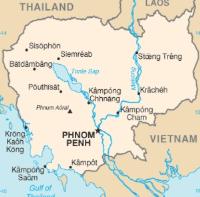PHNOM PENH, Cambodia -- U.S. policymakers have raised security concerns about radical Islamic charities in Cambodia after delegations from Kuwait and Qatar promised $700 million in soft loans and investment for the country's embattled infrastructure. In an August speech, U.S. ambassador Joseph Mussomeli said militant groups are vying for influence over the country's Cham Muslims, and that Gulf states should "be careful" where the money goes. Gulf delegates dismissed U.S. worries, claiming their interests in Cambodia -- garnering food security by investing in Cambodia's unused rice fields -- are economic, not cultural. But with $5 million of the loans earmarked to build Muslim institutions, the cultural element is certainly there. Pakistani ambassador to Cambodia Mohammad Younis Khan responded to the concerns over the funding by telling the Phnom Penh Post that Gulf states "simply like to help their Muslim brothers." The loans are the latest demonstration of Middle East-Cambodia ties that began in 1991, when Cambodia's government was established by the Paris peace accords after years of civil war. At the time, Cham Muslims -- nearly wiped out by the Maoist Khmer Rouge regime between 1975 and 1979 -- had little left in the way of religious and moral authority. Islamic charities, some affiliated with militant Saudi Wahhabism, moved in to fill the void, constructing hundreds of religious schools.
Gulf States’ Aid for Cambodia’s Cham Muslims Raises U.S. Concerns

